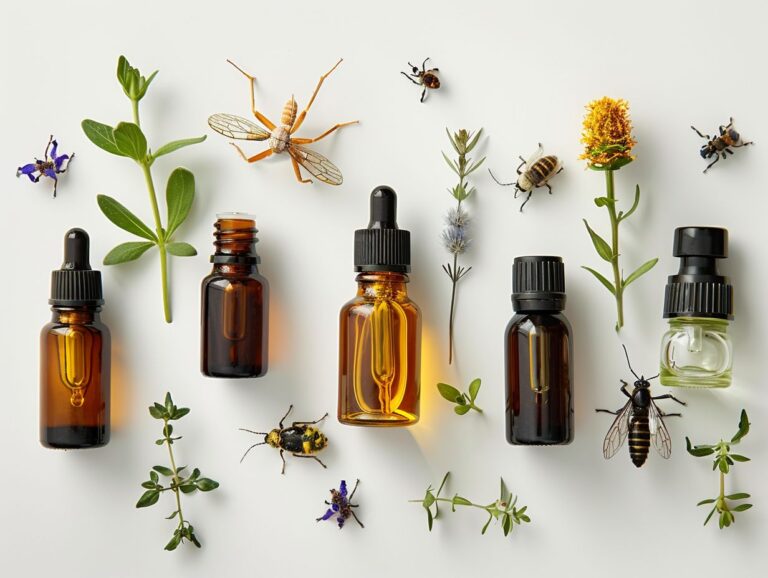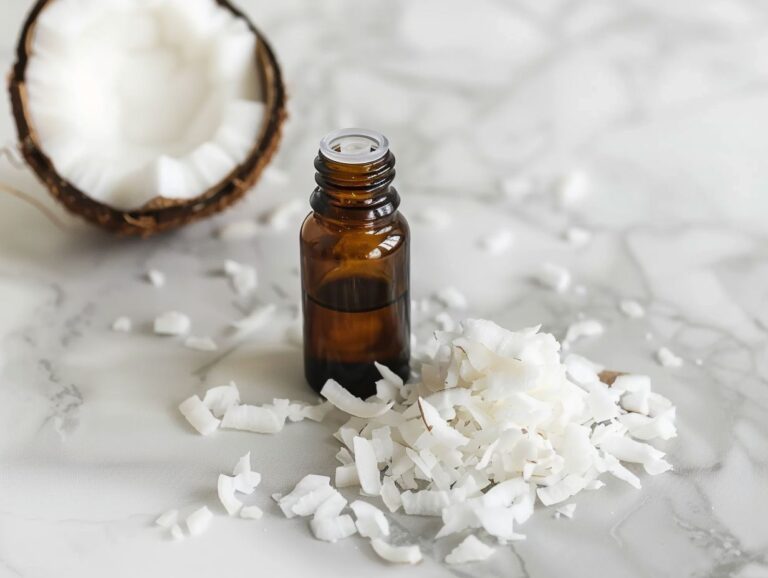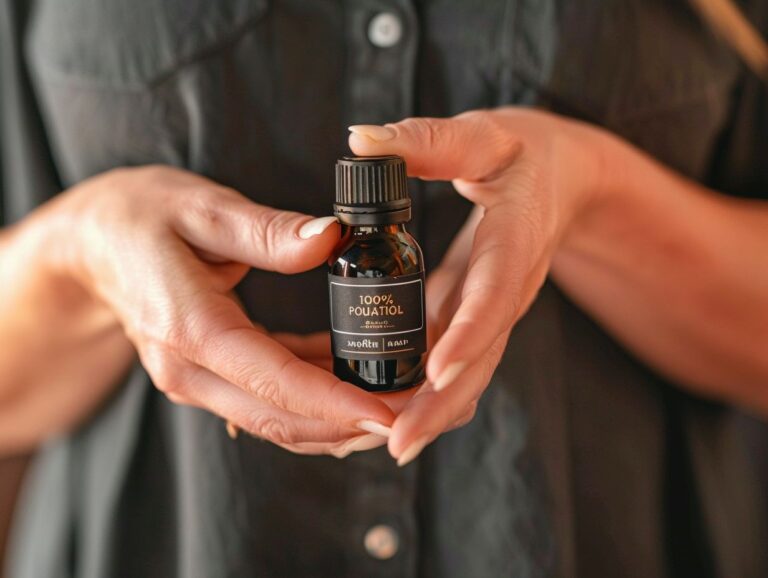Can Essential Oils Interfere With Medications
Essential oils have gained popularity for their therapeutic benefits, but did you know they can potentially interact with medications?
We will explore the risks of using essential oils, their effects on skin, and potential allergic reactions. We will also discuss how essential oils can interact with prescription and over-the-counter medications, as well as herbal supplements.
Learn about precautions to take when using essential oils with antibiotics to ensure your safety and well-being.
Key Takeaways:
What Are Essential Oils?
Essential oils are natural aromatic compounds extracted from plants, known for their potent fragrances and therapeutic properties.
These oils have been used for centuries in various cultures for their healing properties in both physical and emotional well-being. The extraction methods of essential oils vary, with popular techniques including steam distillation, cold pressing, and solvent extraction. Each method results in a concentrated oil that captures the plant’s essence.
In terms of applications, essential oils are commonly utilized in aromatherapy to promote relaxation, improve mood, and alleviate stress. They are often incorporated into massage oils, bath products, and diffusers for inhalation.
How Are Essential Oils Used?
Essential oils are often used in aromatherapy practices through methods like diffusion, topical application, and inhalation.
Not only do essential oils offer a range of pleasant scents that can help relax and calm the mind, but they are also known to possess a plethora of therapeutic benefits. For instance, certain essential oils like lavender are widely used in massage oils due to their natural sedative properties, which can help alleviate stress and anxiety. The anticoagulant properties of oils such as eucalyptus make them ideal for diffusing in households to aid in respiratory health and purify the air. Whether it’s creating custom bath products, using during meditation, or even incorporating them in household cleaning for their antibacterial properties, essential oils have versatile applications that cater to a variety of needs.
What Are the Risks of Using Essential Oils?
While essential oils offer many benefits, they also pose risks, especially when used in conjunction with certain medications that can lead to harmful interactions.
When essential oils are not used with caution, they may interfere with prescribed medications, particularly in individuals with pre-existing conditions like diabetes or undergoing cancer treatments. These natural extracts contain potent compounds that can affect the metabolism of drugs in the body, causing unexpected side effects. It’s crucial for individuals to consult with a healthcare provider before incorporating essential oils into their routine, especially if they are taking medications for chronic conditions. Being aware of potential drug interactions can prevent adverse outcomes and ensure safe usage of essential oils in daily life.
Are Essential Oils Safe to Use on Skin?
When used appropriately and in diluted form, essential oils can be safe for topical application on the skin, providing benefits like moisturization and aromatherapeutic effects.
It is important to always remember that essential oils are highly concentrated plant extracts, and their direct application to the skin without proper dilution can lead to adverse effects.
Proper dilution ratios are crucial to ensure that the essential oil is gentle on the skin while still delivering its therapeutic properties. For most adults, a general guideline is to dilute one drop of essential oil in about 1 teaspoon of carrier oil, such as coconut or jojoba oil.
Some individuals may have sensitivities to certain essential oils, leading to skin irritation or allergic reactions. It is recommended to perform a patch test before applying any essential oil topically.
In terms of specific interactions with medications or health conditions, caution is advised. For instance, grapefruit oil can interact with certain medications, so it is crucial to seek advice from a healthcare professional before using it topically.
In cases such as undergoing anesthesia, some essential oils can impact anesthesia efficacy, hence informing your healthcare provider beforehand is essential in ensuring safety during medical procedures.
Can Essential Oils Cause Allergic Reactions?
Some individuals may experience allergic reactions to certain essential oils, manifesting as skin irritation, redness, or respiratory issues upon exposure.
Allergic reactions to essential oils can vary in intensity and manifestation depending on the individual’s sensitivity. Common symptoms may include itching, swelling, hives, or even difficulty breathing. Factors that increase the risk of experiencing these reactions include pre-existing allergies, asthma, or sensitive skin.
It’s crucial to conduct a patch test before using a new essential oil, especially if prone to allergies. Preventive measures such as diluting oils properly, choosing reputable brands like Young Living, and avoiding direct sunlight after applying photosensitive oils like lemon oil can help minimize the risk of allergic reactions.
What Are the Potential Interactions Between Essential Oils and Medications?

Essential oils can influence drug metabolism through mechanisms like enzyme inhibition, potentially altering the effectiveness and safety of certain medications.
This interaction is particularly crucial for individuals taking medications like blood thinners, antidepressants, or even birth control pills.
For example, some essential oils, such as lavender or chamomile, can have a blood-thinning effect. If combined with medications like Warfarin, which also has blood-thinning properties, it can lead to an increased risk of bleeding. Similarly, essential oils like grapefruit can interfere with the metabolism of certain antidepressants, potentially causing adverse effects.
Can Essential Oils Interact with Prescription Medications?
The interactions between essential oils and prescription medications can lead to adverse effects or reduced efficacy of the drugs, making it crucial to consult healthcare professionals.
For instance, certain essential oils like lavender and chamomile may interact with sedative medications, intensifying their effects and causing excessive drowsiness. This could pose a serious risk, especially for individuals operating heavy machinery or driving.
In cases of surgery, essential oils such as clove or wintergreen that have anticoagulant properties may interfere with blood clotting, potentially leading to excessive bleeding during or post-surgery.
Patients with diabetes taking insulin should be cautious as some oils like cinnamon or fenugreek can further lower blood sugar levels, requiring close monitoring and possible adjustment of medication doses.
Similarly, individuals on hypertension medication need to be aware that oils like rosemary or sage can affect blood pressure regulation, necessitating regular monitoring and potential consultation with healthcare providers.
Can Essential Oils Interact with Over-the-Counter Medications?
Essential oils may interact with over-the-counter medications, altering their effects or causing unexpected reactions due to shared pathways or mechanisms in the body.
When essential oils are used in conjunction with certain medications, particularly anticoagulants, the risk of increased bleeding may be a concern. For example, oils like clary sage or wintergreen could potentially enhance the effects of anticoagulant drugs, leading to excessive bleeding. Individuals taking thyroid medications should exercise caution as oils like peppermint or lavender may interfere with the absorption or effectiveness of these drugs.
Diuretics, commonly used to manage blood pressure, may be impacted by essential oils with diuretic properties such as juniper berry or parsley seed. This interaction could result in excessive water loss, electrolyte imbalances, or altered blood pressure levels.
Can Essential Oils Interact with Herbal Supplements?
The concurrent use of essential oils and herbal supplements can result in complex drug interactions, affecting absorption rates and overall therapeutic outcomes.
This is especially crucial when considering the potential effects on medications like sedatives or blood thinners, as certain compounds in essential oils or herbs may enhance or diminish their effects. Interactions with transdermal medications can alter their systemic circulation. It is essential for individuals, especially those on multiple medications, to consult healthcare professionals or pharmacists before introducing new essential oils or herbal supplements into their regimen. Understanding how these combinations can impact drug metabolism and efficacy is vital for optimizing health outcomes and minimizing potential risks.
How Can Essential Oils Affect the Absorption and Metabolism of Medications?
Essential oils have the potential to alter the absorption and metabolism of medications by influencing enzyme activities or competing for metabolic pathways within the body.
For instance, some essential oils possess sedative properties that can interact with medications such as:
- antidepressants
The complex interplay between essential oils and drug metabolism involves the inhibition of CYP enzymes, crucial for the breakdown of drugs. This inhibition can result in higher drug concentrations in the body, leading to potential side effects or altered therapeutic outcomes. Essential oils are known to engage in drug-drug interactions, especially concerning medications like calcium channel blockers, where concurrent use can impact their efficacy or safety.
Can Essential Oils Increase the Effects of Medications?
Essential oils have been known to enhance the effects of certain medications by potentiating their actions or altering their pharmacokinetics through metabolic interactions.
For individuals with diabetes, incorporating essential oils like cinnamon or fenugreek into their routine can complement their anti-diabetic medications by helping to regulate blood sugar levels.
When utilized in conjunction with anesthesia, specific essential oils such as lavender or chamomile may assist in reducing anxiety and promoting relaxation, potentially leading to a smoother recovery post-surgery.
In cases where diuretics are prescribed, essential oils like juniper berry or parsley seed may enhance the diuretic effect, aiding in fluid balance and renal function.
Can Essential Oils Decrease the Effects of Medications?

For example, grapefruit essential oil has been found to interfere with enzymes in the liver responsible for metabolizing drugs, leading to higher drug concentrations in the body than expected. This can be particularly concerning for individuals undergoing cancer treatments, where precise dosing and drug levels are critical for successful outcomes.
In addition, certain essential oils like lavender and chamomile, commonly used for their calming effects, have been shown to interact with sedatives and other central nervous system depressants. This interaction could result in enhanced sedative effects, increasing the risk of oversedation or other adverse reactions.
Can Essential Oils Affect the Side Effects of Medications?
Essential oils might influence the occurrence and severity of medication side effects by modulating metabolic pathways or interacting with drug targets, leading to altered symptom profiles.
In terms of individuals taking thyroid medications, understanding how essential oils can impact drug interactions is vital. Certain essential oils, such as lavender or peppermint, have the potential to interfere with the absorption or metabolism of thyroid medications, affecting their efficacy.
It’s crucial to approach essential oil usage with caution, as some oils can enhance the effects of certain medications, possibly leading to unintended side effects. Thus, knowing the safety guidelines and consulting a healthcare professional is essential to avoid any adverse reactions when combining essential oils with medications.
What Precautions Should Be Taken When Using Essential Oils with Medications?
When using essential oils alongside medications, it is essential to take precautions such as consulting healthcare professionals, performing patch tests, and researching potential interactions.
One critical consideration is the potential effects of essential oils on blood thinning medications. Certain oils like cloves, ginger, and wintergreen can enhance the blood-thinning effects, which may pose risks when combined with medications like warfarin or aspirin.
For individuals undergoing surgery or anesthesia, specific essential oils, especially those with sedative properties like lavender or chamomile, should be used cautiously to avoid interference with anesthesia drugs.
Understanding the complexities of drug metabolism is crucial. Different oils can influence the enzymes responsible for breaking down medications in the body, potentially altering their effectiveness or causing unexpected side effects.
Consult with a Healthcare Professional
It is crucial to consult with a qualified healthcare professional before using essential oils in conjunction with medications to ensure safety and minimize the risk of adverse drug interactions.
In terms of using essential oils alongside medications, seeking expert advice becomes paramount to navigate the potential complexities of these interactions. For instance, certain essential oils, such as peppermint or lavender, may have effects on the body that could impact the efficacy of medications like birth control pills or calcium channel blockers.
Personalized guidance from a healthcare provider is essential to understand how these substances can interact within your body. By involving a professional in the decision-making process, you can receive tailored recommendations and appropriate monitoring to ensure that the combination is safe and effective for your specific health needs.
Perform a Patch Test
Before widespread application, it is advisable to perform a patch test with diluted essential oils on a small area of skin to assess potential sensitivities or allergic reactions.
This simple yet crucial step involves diluting the essential oil with a carrier oil like coconut or almond oil to minimize the risk of irritation. Apply a small amount of the diluted mixture to the inner forearm or the back of the ear, as these areas are more sensitive. Let it sit for 24 hours, observing any signs of redness, itching, or swelling. If you have diabetes or are on diuretics, extra caution is needed as certain essential oils can interact with medications or affect blood sugar levels.
Research the Potential Interactions
Engaging in thorough research on potential interactions between essential oils and medications can provide valuable insights into the risks and benefits of combined usage for individual patients.
When considering the use of essential oils alongside conventional medications, it’s crucial to understand how these substances may interact within the body. For instance, some essential oils like lavender or chamomile are known for their sedative properties, which could potentially enhance the effects of certain medications such as benzodiazepines.
On the other hand, individuals taking anticoagulants should exercise caution with essential oils like wintergreen or eucalyptus, as these can also have blood-thinning properties, potentially leading to unwanted side effects or complications.
Frequently Asked Questions
Can essential oils interfere with medications?
Yes, some essential oils can interact with medications and potentially cause harmful side effects.
Which medications can be affected by essential oils?
Some commonly used medications that may be affected by essential oils include blood thinners, antidepressants, and high blood pressure medications.
How do essential oils interfere with medications?
Essential oils contain compounds that can interact with enzymes in the body and affect the way medications are metabolized, potentially causing them to be less effective or more potent.
Are there any essential oils that are known to cause interactions with medications?
Yes, some essential oils that have been known to cause interactions with medications include grapefruit, lavender, and eucalyptus.
Should I stop using essential oils if I am taking medications?
It is important to consult with your healthcare provider before using essential oils if you are taking medications. They can advise you on any potential interactions and how to safely incorporate essential oils into your routine.
Are there any precautions I should take when using essential oils with medications?
Always follow recommended dosages and dilution ratios when using essential oils, and inform your healthcare provider of any essential oils you are using. It is also important to monitor for any potential side effects or changes in medication effectiveness.









One Comment